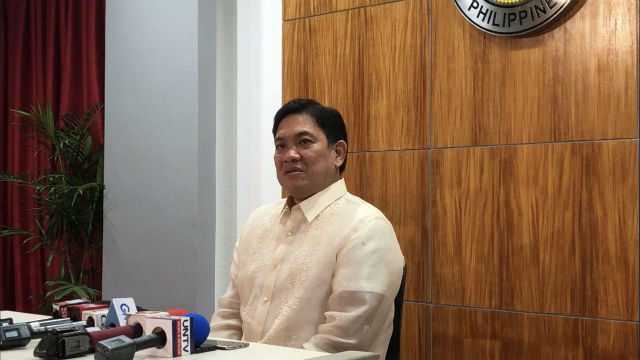SUMMARY
This is AI generated summarization, which may have errors. For context, always refer to the full article.

MANILA, Philippines – House Majority Leader Rolando Andaya said lawmakers will “most likely” resolve the ongoing battle for the minority leadership by putting it up to a vote at the plenary this week.
Andaya spoke to reporters after 1-SAGIP Representative Rodante Marcoleta, who was acting as the majority floor leader during the session on Monday, August 6, moved to recognize Quezon 3rd District Representative Danilo Suarez as the minority leader.
Before making the motion, Marcoleta delivered a privilege speech arguing why Suarez should be recognized.
But Andaya said Marcoleta did this out of his own personal capacity, as there was no instruction from the House leadership for him to do so. Still, Andaya said the leadership wants the minority row resolved within the week.
Asked if the issue would be resolved through a plenary vote, Andaya replied: “That would be the likely [option], if things will not be resolved by tomorrow. Most likely.”
“It would depend on what motion will be propounded. Anyone can propound the motion,” he added.
There is currently a 3-way battle for the minority leadership at the House.
First is the 25-member group of Suarez, who was the minority leader when Davao del Norte 1st District Representative Pantaleon Alvarez was still speaker. Suarez and most of his bloc’s members voted yes to Pampanga 2nd District Representative Gloria Macapagal Arroyo replacing Alvarez. But Suarez insists he still holds the same post.
Then there is Marikina 2nd District Representative Miro Quimbo, who was elected as the minority leader of the 25-member alliance of lawmakers from the Liberal Party, Makabayan, and the “Magnificent 7” independent minority.
The 3rd lawmaker to lay claim over the minority leadership is Arts, Business, and Science Professionals Representative Eugene de Vera, who was elected by 13 members from the bloc of Alvarez and former majority leader Rodolfo Fariñas.
How did Marcoleta argue for Suarez as minority leader? Marcoleta cited Rule 3 of the House rules, which states that there are two instances when the House can vote for the speaker: when the first regular session begins and whenever there is a vacancy.
The same House rule states that all lawmakers who voted for the winning candidate for speaker constitute the majority, while all those who did not vote will form the minority.
Marcoleta said that when the House opens its session for the first time, there is a need for lawmakers to organize themselves, like when Alvarez was elected speaker in 2016.
But Marcoleta said that when Arroyo was elected for the same post on July 23, no reorganization of the House happened. Only the speakership was declared vacant.
Marcoleta argued that had Suarez abstained from voting, he would not have been able to express his intention to oust Alvarez.
“The truth is, when the honorable Suarez opted to support and vote for Speaker GMA, all that he wanted was a change in leadership. This is a right that he can exercise as a member of this House when vacancy arises in House speakership. After all, the rule says all members [may do so], without any distinction as to majority or minority,” Marcoleta said.
But what about the Supreme Court (SC) ruling on the Baguilat vs Alvarez et al case? Even if Fariñas and Quimbo are citing this SC case to defend their arguments, it cannot be applied to the minority leadership row, according to Andaya. (READ: Fariñas ‘going to SC’ if Suarez stays as House minority leader)
He said this is because the Court’s ruling regarding who constitutes the majority and minority blocs only applies to the initial organization of the House – the same argument as that of Marcoleta.
In 2016, the so-called “Magnificent 7” bloc of Ifugao Representative Teddy Baguilat Jr also contested Suarez’s claim as minority leader before the SC.
In past Congresses, the lawmaker who got the second highest votes in the speakership race automatically became the minority leader. At the time, Alvarez got 251 votes, Baguilat got 8 votes, and Suarez only got 7 votes as he voted for Alvarez.
Baguilat’s allies argued he should have been declared as the minority leader. But the Alvarez-led majority bloc changed the rules and the minority bloc became mandated to choose their leader in a separate election. All those who did not vote for Alvarez automatically became part of the minority.
This was upheld by the SC, which said it did not find any abuse of discretion on the part of the then-majority bloc to change the House rules.
But Andaya pointed out that in the same decision, the SC also said it cannot intervene in procedural rules of the House, a co-equal branch.
“What is happening now is procedural matter. So anyone can make a motion on which we can vote,” added the majority leader. – Rappler.com
Add a comment
How does this make you feel?
There are no comments yet. Add your comment to start the conversation.